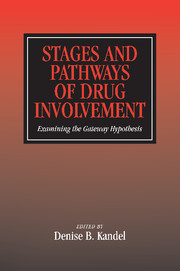Book contents
- Frontmatter
- Contents
- List of Contributors
- Foreword
- Preface
- Part I Overview
- Part II Recent Substantive Findings: What Do We Know About Stages of Drug Use, Risks, and Protective Factors?
- Part III Impact of Prevention Interventions: A Test of the Progression Hypothesis
- Part IV Methodological Issues and Approaches: Advantages and Limitations of Alternate Methods
- Part V Animal Models and Biological Processes: Implications for Drug Progression
- 13 The Value of Animal Models to Examine the Gateway Hypothesis
- 14 Sensitization as a Process Underlying the Progression of Drug Use via Gateway Drugs
- 15 Neurobiology of Drug Addiction
- Part VI Conclusion
- Index
14 - Sensitization as a Process Underlying the Progression of Drug Use via Gateway Drugs
Published online by Cambridge University Press: 25 July 2009
- Frontmatter
- Contents
- List of Contributors
- Foreword
- Preface
- Part I Overview
- Part II Recent Substantive Findings: What Do We Know About Stages of Drug Use, Risks, and Protective Factors?
- Part III Impact of Prevention Interventions: A Test of the Progression Hypothesis
- Part IV Methodological Issues and Approaches: Advantages and Limitations of Alternate Methods
- Part V Animal Models and Biological Processes: Implications for Drug Progression
- 13 The Value of Animal Models to Examine the Gateway Hypothesis
- 14 Sensitization as a Process Underlying the Progression of Drug Use via Gateway Drugs
- 15 Neurobiology of Drug Addiction
- Part VI Conclusion
- Index
Summary
Both cross-sectional and longitudinal studies have demonstrated that use of illicit drugs, like cocaine, is reliably preceded by use of other drugs, like nicotine and alcohol (Yamaguchi & Kandel, 1984; Kandel & Davies, 1991; Kandel et al., 1992; Kandel & Yamaguchi, 1993; Merrill et al., 1999). The Gateway Hypothesis of drug abuse posits that the use of some drugs (Gateway drugs) increases the risk of subsequent drug abuse. If so, identification of factors that predispose to Gateway drug use may lead to early identification of those at risk for other drug use.
Several hypotheses have focused on either personality characteristics or environmental circumstances in the use of drugs and the progression of drug use (Jessor et al., 1980; Donovan et al., 1985; Donovan & Jessor, 1985; Wood et al., 1995; Costa et al., 1989; Donovan & Jesser, 1983; Swadi, 1999). For example, sensation seeking traits have been hypothesized to predict the initial foray into experimentation with psychoactive drugs (Wills et al., 1994). Because of the relative ease of procurement of nicotine and alcohol, these drugs would be most likely to be the ones used first. Initial use of other, more difficult to obtain and illicit drugs may follow as a result of a continuing search for new sensations and exposure to environmental circumstances that are more amenable to obtaining of these drugs.
- Type
- Chapter
- Information
- Stages and Pathways of Drug InvolvementExamining the Gateway Hypothesis, pp. 318 - 336Publisher: Cambridge University PressPrint publication year: 2002
- 10
- Cited by



